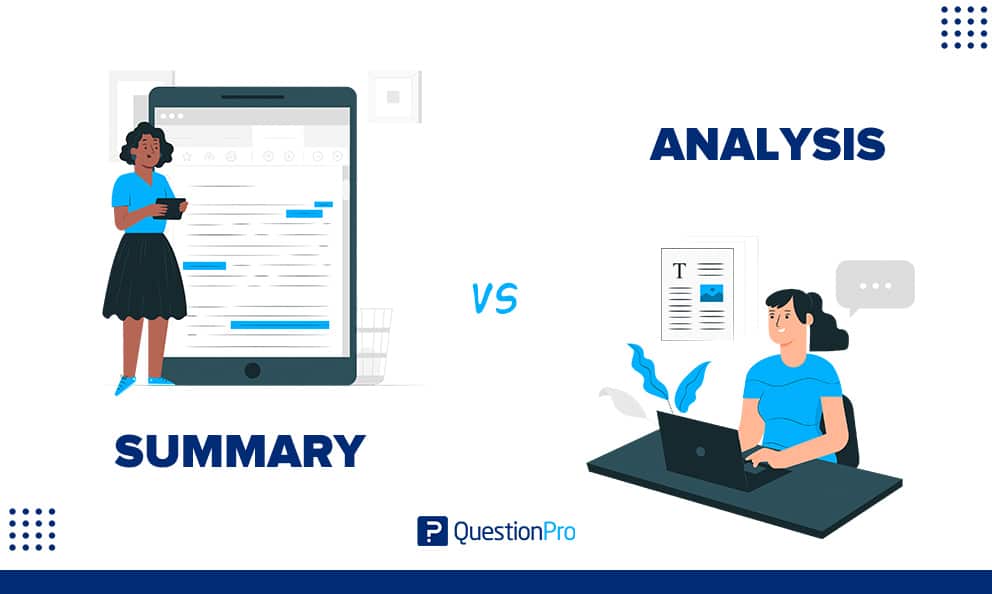 Reading Time: 4 minutes read
Reading Time: 4 minutes readDo you know what’s the difference between summary vs analysis? You may have spent the last few years thinking they are the same. But you will be surprised to learn that they are two different things.
Let’s say it’s time for homework, and your history teacher tells you to write a summary and analysis of World War I. How could someone say that? Wait a minute! A summary is not the same as an analysis? How could that be?
Well, we’ll tell you what’s different now. Before that, let’s start with the definition of summary and analysis.
Definition of summary
A summary is the part of the text that explains or restates what the content is about. It is typically written concisely. The summary is a short description of the context that helps the reader understand the topic or plot in a shorter amount of time.
Usually, a summary is called the “what” of the text. It only shows what happened. A lot of the main points are brought out in the summary. Usually, it is written in the person’s own words. The summary is a short, to-the-point summary of the whole article, thesis, or other text.
If you want to get the main idea of a topic as a reader, you should read the summary. Usually, a summary is written at the beginning of the text and in every paragraph if there are sections and subsections. Every section or subsection should say what it’s about right at the start.
To write a summary, you write down the main points of that subpart. Then, the main points are put together to make sentences. It is a part of the text that doesn’t need as much research as the analysis part.
Any topic can be summed up, and it can be said out loud or written down.
Definition of analysis
An analysis is a block or series of blocks of text that explain and talk in detail about every fact or idea. The analysis is usually written in a detailed way. It tells about everything that happens. It also talks about how a certain action relates to the main idea of the text.
Most people call the analysis the “how” of the text. It looks into the facts in a lot of connected pieces and concludes. Every part of the idea is broken up and carefully looked at. To make the work seem more accurate, the analysis argues and talks about the details.
If you have to trust a text as a reader, you must read the analysis. The facts and numbers aren’t just thrown out there. But every fact is broken down. Which helps figure out the right reasons. The analysis talks about what happened and why.
An analysis is a well-thought-out guess that is backed up by valid evidence that already exists in the world. It also makes it easier to see how the different parts of the text fit together. It also helps get across the meaning of the situation. The theme can be looked at and figured out with enough practice.
Comparison Table Between summary vs analysis
| Parameters for comparing | Summary | Analysis |
| Definition | It helps you figure out what the main ideas, plots, or themes are. | It’s helpful to talk about the ideas, plots, or main idea. |
| Usage | Clear identification of the facts | It breaks down the facts and investigates the same. |
| Text Size | Concise and short | In-depth and clear |
| Conclusion | It doesn’t make a decision or come to a conclusion. | It helps come to the best and most important conclusions. |
| Interpretation | Gives only the facts | Explain each fact in detail and ask questions about every single one. |
Main differences between summary vs analysis
- The size of the text is the main difference between summary and analysis. A summary is short and is always written in a clear, brief way. The analysis is a more detailed version of the text, which is always written in a more lengthy way.
- Another difference between summary vs analysis is summary gives a brief overview of the facts, while analysis talks about the facts.
- A summary is always written directly, and the information is given without any evidence to back it up. The analysis aims to give as much evidence as possible to back up the information.
- The summary helps you take notes from a lecture and answer important questions. Analysis helps you come up with a thesis statement. Also, analysis helps you choose a topic for a research paper.
- One more difference between summary vs analysis is summary helps the reader understand the context of the text quickly, while analysis helps the reader trust what they are reading.
Conclusion
Even though a summary and an analysis can help each other, they are still two different things that can be written on their own. When it comes down to it, no one is better than the other. Because a summary gives a short excerpt of the main points of a subject while an analysis gives an overall conclusion that most of the time comes from the writer’s opinion.
So, the next time a classmate is going crazy trying to figure out the difference between a summary vs analysis, you’ll be able to help them.
QuestionPro’s Academic Research Software is a strong and flexible platform that lets you customize your analysis options and use predictive modeling for forecasting or trend analysis. QuestionPro is the only academic research software with these features that you need to look for.




















